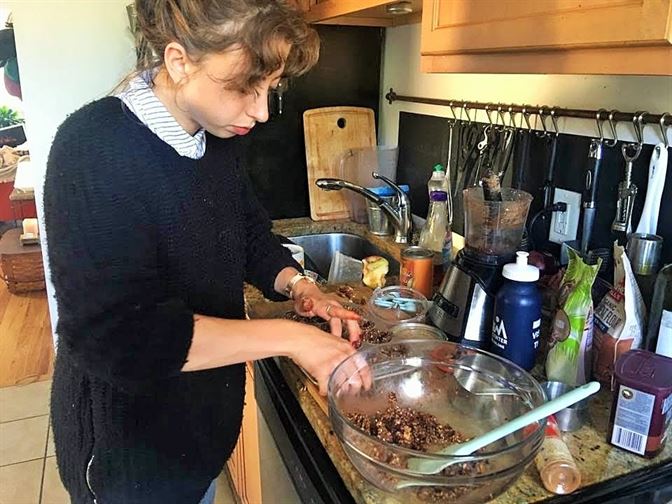
If you’re making sweet treats this Valentines Day, try using healthier baking
options such as whole-wheat flour. Photo Courtesy of Bailee Boyko
Embrace Valentine’s Day with heart-healthy baking alternatives for campus bake sales, your valentine or yourself.
February is all about the heart. The month is nationally recognized as American Heart Month, an annual campaign that raises awareness of heart disease. During a month that pays extra attention to heart health, why not apply this focus to the day of the heart itself: Valentine’s Day.
Valentine’s Day is right around the corner and this means reaching into the back of your cabinets for those standard baking ingredients. There are three ingredients we associate with the word “baking.” They are flour, sugar and butter. These ingredients lend themselves to a plethora of cookie and cake recipes.
But why do we continually stick to only these options? According to the American Heart Association, there are other ways to enjoy holiday baking while keeping the heart healthy. Whether you’re baking for a campus bake sale, a loved one or even yourself, try replacing these three ingredients with healthier options for a nutritiously sweet-packed Valentine’s Day.
1. Flour
Most cookie recipes call for all-purpose flour. It is commonly referred to as refined flour because of how it has been processed. This flour is stripped of all of the nutrients that a whole kernel contains, such as the bran, which has fiber and wheat germ, and contains healthy fats. Consuming flour devoid of these important nutrients increases triglycerides, a type of fat circulating in the blood which can increase one’s risk of having a stroke or heart attack.
Try using whole-wheat flour, which uses the whole kernel and is not stripped of the bran or wheat germ. This will give your baked goods more fiber to digest slower and heart-healthy polyunsaturated fats. Another good option is almond flour because the only ingredient is almonds. Almonds contain monounsaturated fats, which are good for heart health. Other healthy flour substitutions include buckwheat flour, oat flour and quinoa flour.
2. Sugar
According to the newest Dietary Guidelines For Americans, added sugars add calories without any essential nutrients. Intake of too much sugar can increase the risk of obesity and diabetes, which play a role in heart disease. To get the sweet factor in a healthier fashion, one alternative is using date paste. Dates are a great alternative because they are naturally sweet. They are also a good source of potassium, which promotes normal blood pressure and maintenance for a healthy heart. Black strap molasses is another healthy substitute because it contains all of the vitamins and minerals that white sugar has been stripped of during processing. Similar to dates, it is high in potassium, which aids a healthy heart. Other healthy sugar substitutes include coconut sugar, stevia leaf extract and honey.
3. Butter
Butter adds to the tenderness of baked goods that is loved so dearly. However, butter is composed predominantly of saturated fats, which, if over-consumed, are connected with heart problems. The Dietary Guidelines For Americans suggest that intake of saturated fats should be limited to less than ten percent of calories per day. Try swapping out butter for olive oil, which contains a high amount of heart-healthy monounsaturated fats. Monounsaturated fats may help lower one’s risk of heart disease by lowering total cholesterol and low-density lipoprotein (“bad”) cholesterol levels.
Another excellent substitution is avocado. Avocados have many vitamins and minerals, and contain monounsaturated fats. Avocado is commonly referred to as “nature’s butter” because it offers a creamy texture similar to butter. It also is neutral in taste and adapts well to recipes. Other healthy butter substitutes include coconut cream or oil, applesauce and pumpkin puree.


